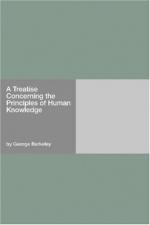25. Unless we take care to clear the first principles of knowledge from the embarras and delusion of words, we may make infinite reasonings upon them to no purpose; we may draw consequences from consequences, and be never the wiser. The farther we go, we shall only lose ourselves the more irrecoverably, and be the deeper entangled in difficulties and mistakes. Whoever therefore designs to read the following sheets, I entreat him to make my words the occasion of his own thinking, and endeavour to attain the same train of thoughts in reading that I had in writing them. By this means it will be easy for him to discover the truth or falsity of what I say. He will be out of all danger of being deceived by my words, and I do not see how he can be led into an error by considering his own naked, undisguised ideas.
OF THE PRINCIPLES OF HUMAN KNOWLEDGE
1. Objects of human knowledge.—It is evident to any one who takes a survey of the objects of human knowledge, that they are either ideas actually imprinted on the senses; or else such as are perceived by attending to the passions and operations of the mind; or lastly, ideas formed by help of memory and imagination—either compounding, dividing, or barely representing those originally perceived in the aforesaid ways. By sight I have the ideas of light and colours, with their several degrees and variations. By touch I perceive hard and soft, heat and cold, motion and resistance, and of all these more and less either as to quantity or degree. Smelling furnishes me with odours; the palate with tastes; and hearing conveys sounds to the mind in all their variety of tone and composition. And as several of these are observed to accompany each other, they come to be marked by one name, and so to be reputed as one thing. Thus, for example a certain colour, taste, smell, figure and consistence having been observed to go together, are accounted one distinct thing, signified by the name Apple. Other collections of ideas constitute a stone, a tree, a book, and the like sensible things—which as they are pleasing or disagreeable excite the passions of love, hatred, joy, grief, and so forth.
2. Mind—spirit—soul.—But, besides all that endless variety of ideas or objects of knowledge, there is likewise something which knows or perceives them, and exercises divers operations, as willing, imagining, remembering, about them. This perceiving, active being is what I call mind, spirit, soul, or myself. By which words I do not denote any one of my ideas, but a thing entirely distinct from them, wherein they exist, or, which is the same thing, whereby they are perceived—for the existence of an idea consists in being perceived.




